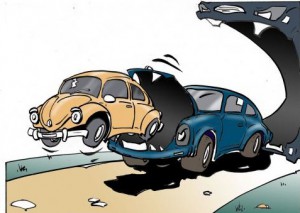Is this the end of the people’s car?
Bernhard Rieger writes: The US Environmental Protection Agency’s announcement on September 18 that Volkswagen had manipulated diesel engines during emissions tests sent shockwaves around the Western world. Facing hefty fines in the United States and elsewhere, the corporation soon revealed that no fewer than 11 million of its vehicles were powered by an engine that it had previously praised as ecologically friendly and now revealed as a generator of hazardous exhaust. The company’s stock took a dive, CEO Martin Winterkorn had to resign, and drivers on both sides of the Atlantic filed class action lawsuits. German engineering, once a catchword for excellence, has now gained a set of decidedly undesirable connotations.
Beyond anger, the international response to Volkwagen’s fraud has been tinged with disbelief. Politicians, experts, and ordinary citizens alike have struggled to comprehend why Volkswagen, of all companies, engaged in systematic cheating. Observers were not only flabbergasted that a high-profile car manufacturer had risked sizeable fines from regulators as well as claims for damages by consumers, stockholders, and dealers. They were also stunned at the reputational risk. For Volkswagen, as a U.S.-marketing expert pointed out, being caught cheating was “significantly damaging” because “this is such an iconic brand.” In Germany, the business-friendly Frankfurter Allgemeine Zeitung simply declared that Volkswagen had lost its “honor”—a concept rarely evoked in the context of global corporate giants.
Volkswagen thus finds itself at the center not just of an economic disaster, but a moral scandal of international reach.
Now, by manipulating emissions data for years, Volkswagen did more than cheat regulators and customers. Given its extraordinarily rich and long-standing reputation for quality and dependability, Volkswagen committed a cardinal sin against its own identity. It blemished its “corporate soul,” as historian Roland Marchand called the intangible aura surrounding those enterprises that manage to project themselves in the public sphere as socially and economically responsible agents. To regain customers’ trust, public penance will not be enough. Rather, it will need to undertake demonstrable reforms to assure the public that there are robust internal procedures to prevent fraud. Only then will Volkswagen be in a position to build anew. The End of the Beetle

